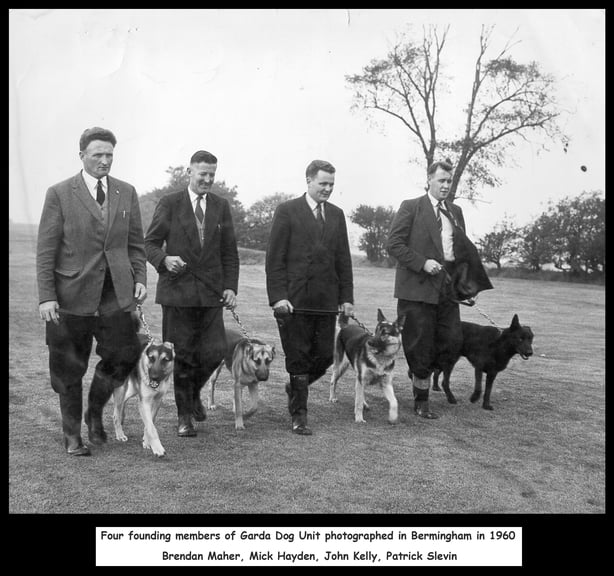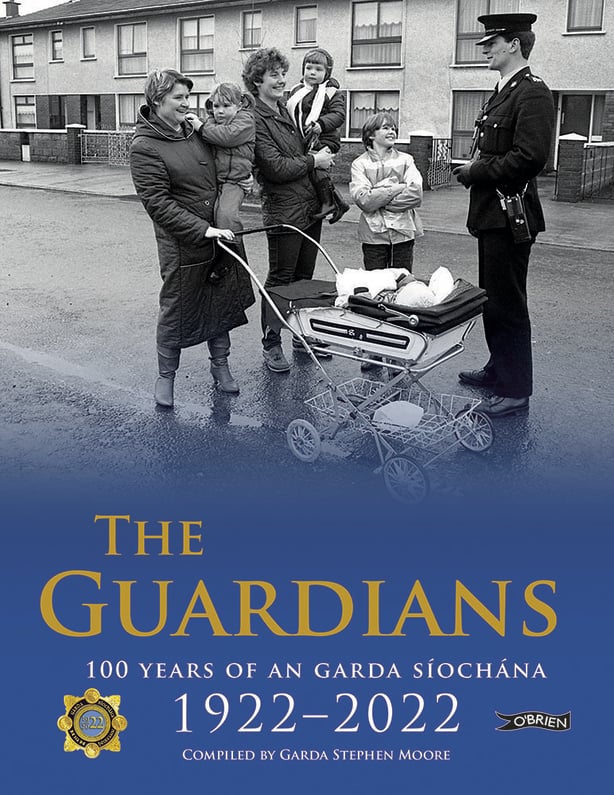We present an extract from The Guardians - 100 Years of An Garda Síochána 1922-2022, the new essay collection compiled by Garda Stephen Moore and published by The O'Brien Press.
Formed in the turbulent period between the War of Independence and the Civil War, An Garda Síochána had been tasked with restoring law and order in the new Irish Free State. A century later, with the evolution of crime and following major societal changes, policing faces new challenges in a very different Ireland. Nevertheless, 'the guardians of the peace' retain their commitment to serving the Irish people and keeping them safe.
Compiled by Garda Stephen Moore, these collected essays include individual and personal stories of Gardaí past and present. Combined with accounts by historians and academics, they provide a unique insight into policing in Ireland over the past hundred years.
Garda Alan Cummins on The National Garda Dog Unit
The first tentative steps at using dogs for policing in this country were taken on 20 September 1935, when the first Civic Guard Police Dog Championships were held in the grounds of what is now the Royal Hospital Kilmainham (RHK). At the time, the RHK was being used as Garda Headquarters and was overseen by the then Commissioner, Colonel Eamon Broy. The idea of the event was to showcase the abilities of the German Shepherd dog and how these dogs could be used to assist Gardaí in their duties. The handlers were members of An Garda Síochána, and they used their own private dogs for the event. The main competition was won by a Sergeant from Nenagh, with his dog, 'Wolf of Nenagh’, who, according to The Irish Times of 21 September 1935, ‘lived up to his fearsome name’.
The years between 1935 and 1960 did not lead to any further progress being made in the introduction of dogs to assist in policing matters in Ireland. The use of dogs at that time was ad hoc at best, and certainly done on an informal basis. There are varying reports of ‘Station dogs’ being kept at some city-centre stations and being brought out to break up public disturbances.
In 1960, however, a decision was made to set up a Garda dog unit formally. The unit was to be based in an unused building to the rear of Kilmainham Garda Station. Initially four Garda handlers and a Sergeant were sent to the UK to train with British police dog handlers. The dogs they trained with were supplied by our British colleagues. After three months, the handlers returned to take up their new duties and formally begin their ‘pawtrols’. The unit is still based at Kilmainham Garda Station.
In 2005, the Dog Unit was extended to the Southern Region, with bases in Limerick and Cork; owing to its success, it later became a permanent unit. Garda dogs attached to the unit are trained in a number of disciplines: Drugs/Cash/Firearms (DCF) detection, Explosive Detection (ED), and General-Purpose duties (GP). Operating as a part of a Garda dog team involves 24-hour care of the dog all year round. This includes regular refresher training in the above disciplines, in addition to normal operational policing duties.

The most common breeds of dog used by the Garda Dog Unit are German Shepherds, Belgian Malinois, Labradors and Springer Spaniels. The dedication and commitment of the team at the Garda Dog Unit throughout the years has played a critical role in supporting and assisting uniformed operational units and national specialist units with the policing of organised and serious crime, state security, drugs crime, public order, searches for missing persons, community engagement and major events.
When people think of police dogs, they often think of ‘sniffer dogs’ for drugs, but that is not the entire picture. Most handlers will be asked to handle at least two different dogs, for two different roles, at any one time. Most will have a ‘General Purpose Dog’, which is generally a German Shepherd or Belgian Malinois. This is a day-to-day patrol dog, trained to protect and defend the handler, track and locate concealed suspects, search for missing persons, or retrieve items of evidence that contain recent human scent. This is the dog that gets put into the building to search for the burglar at 2 a.m., that searches the forest with its handler in the middle of the night for the violent offender, and that assists in finding vulnerable missing persons. This dog puts itself in harm’s way to protect society. Each handler relies on their General-Purpose dog to return home safely at the end of each shift, because nobody ever knows what a tour of duty will entail on any given day.
The trust between handler and dog works both ways. A handler cares for the animal on a 24/7 basis – the dog lives with the handler, becoming part of the life of the handler’s family; the handler gets up in the middle of the night if the dog is unwell or injured. A handler would never unnecessarily put the dog in harm’s way, but when they do, it is to protect others – either Garda colleagues or the public at large. The dogs we use are not pets. They are highly driven and intense working dogs; they enjoy doing what they do, and they do it because their bond with their handler is so strong.
Other specialist search services that the Garda Dog Unit provides include DCF (Drugs/Cash/Firearms)-detection dogs and EDD (Explosives Detection Dogs). The breeds normally used for this sort of work are Labrador or spaniel types and are of strong hunting lines. To these dogs, life is one big game, and they love nothing more than encouragement, affection, and a reward of play upon completion of a successful search. As the criminals’ methods of concealment become increasingly elaborate, the demand for these specialist search dogs is ever increasing. Time and time again, the natural abilities of the dogs have shown themselves to be unbeatable. Their acute sense of smell is unparalleled. An analogy I use when describing their talents is of a human walking into a kitchen where a stew is cooking and being able to smell the stew. A dog’s nose is so sensitive, however, that it will be able to smell each individual ingredient contained in that stew – although, of course, the last thing any of my dogs would do if they got close enough to an unsupervised pot of stew would be to smell it!

The Guardians - 100 Years of An Garda Síochána 1922-2022, compiled by Garda Stephen Moore, is published by The O'Brien Press

